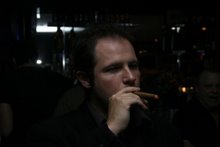As it turns out, I grew up to be both. More than half of everything I drink is served hot and I drink coffee and tea in approximately equal measure, typically tea when I'm at home and coffee when I'm out.
Owing to the formative years I spent in England and, I'm certain, to my grandmother and father's inculations, I am now a tea purist. I have some very particular opinions about my favored beverage, specifically what tea is and what it is not. Mind you, I call myself a tea 'purist' rather than a tea 'snob.' I don't much care about the quality of the tea but rather the composition of the liquid that bears the name, which brings me to the point.
In recent years the U.S. beverage industry has taken to ascribing the word 'tea' to any concoction that involves steeping plant matter in hot water. This is entirely incorrect.
Tea is an actual plant. It is native to Asia, cultivated on all six inhabited continents and known to botanists as Camellia sinensis. The three most general types of true tea, usually denoted by color, white, green and black, are all produced from this plant and differ only in the methods of cultivation and the manner in which the plucked leaves are handled. In order for a beverage to properly be called 'tea' it must contain actual tea. You can spice it. You can sweeten it. You can chill it. You can add milk or do any one of a number of other things to augment it but if there's no actual tea leaves involved,* then it isn't tea.
Chamomile isn't tea, neither is Echinacea nor ginseng nor Labrador. Hot water with lemon is not tea. Red Bush tea, though I confess that I like it, is inaptly named as it is made from rooibos, not tea. Basil water and anything else that falls under then heading 'herbal tea' is properly called an infusion. Why, because it doesn't have any friggin' tea in it and therefore isn't tea anymore than coffee or vegetable soup is.
Please avail yourself of this nomenclature thus.
*Yes, I know, there are a number of kinds of "stem" tea or "mountain" tea that are made from the woody parts of the tea plant. Yes, those are tea also. Aren't you happy with yourself you pedantic little shit.



6 comments:
did you remember to flip the sign?
I heard about a guy who decided to fast, drinking nothing but chamomile tea. It poisoned him and he died.
I don't drink much tea, but I'm picky about what I drink. Hold the Lipton. Twinings and McMurchie are good brands; both English I assume.
As Godawful as English food is (that's my impression from spending 2 weeks in London), the Brits have come up with some cool drink inventions. Bitters (I think Angostura is the actual name) for example. Tastes awful by itself, but mix a few drops with an equal amount of sugar, and it turns the cheapest rotgut whiskey into an incredible taste trip. I think the Brits mix it with gin; I keep meaning to try that.
I don't drink tea or coffee. Pass me the hot chocolate
Not hot water to make tea, but BOILING hot.
Now that's what I call a cuppa.
I think Tom meant is "as Godawful as London food is . . ."
Aha. Working backwards I see you were ex[posed to the same traditions. Grandmother was from Belfast. 'Nuff said.
And as for 'infusions'...it's your blog.
Post a Comment